Table of Contents
Shih Tzu Health Issues

Shih Tzus are one of the most popular toy dog breeds in the world, known for their cute looks and affectionate nature. However, like all dogs, they are prone to certain health issues that owners need to be aware of. In this article, we will discuss some of the most common Shih Tzu health issues and how to prevent and treat them.
Breathing problems and brachycephalic syndrome are among the most common health issues that Shih Tzus face. Their short snouts and flat faces can make it difficult for them to breathe properly, leading to respiratory problems like snoring, wheezing, and shortness of breath.
Additionally, they can develop brachycephalic syndrome, a condition that affects dogs with short snouts and causes breathing difficulties, overheating, and other health issues.
Musculoskeletal problems are another common health issue that Shih Tzus face. Their small size and delicate bones make them prone to fractures, dislocations, and other injuries.
They can also develop joint problems like hip dysplasia and patellar luxation, which can cause pain, lameness, and mobility issues.
In the next section, we will discuss these and other health issues in more detail, as well as how to prevent and treat them.
Key Takeaways
- Shih Tzus are prone to breathing problems, musculoskeletal issues, eye conditions, and other health issues.
- Regular veterinary check-ups, proper grooming, and a healthy diet can help prevent many of these health issues.
- Early detection and treatment are crucial for managing Shih Tzu health issues and ensuring a long and healthy life for your furry friend.
Shih Tzu History and Origin

The Shih Tzu is a small toy breed that has been around for centuries. The breed originated in Tibet and was a favorite of Chinese royalty. One theory is that the breed descended from a cross between the Pekingese and Lhasa Apso, two other small dog breeds that were also popular with Chinese nobility. However, the true origin of the Shih Tzu is still a mystery.
The Shih Tzu was first introduced to the Western world in the early 20th century, and it quickly became a popular breed. In 1934, the breed was officially recognized by the Kennel Club in England. It wasn’t until 1969 that the American Kennel Club recognized the breed.
The Shih Tzu is a purebred dog that has been bred for centuries to be a companion animal. The breed is known for its affectionate and playful nature, as well as its long, flowing coat. The breed’s coat requires regular grooming to keep it healthy and free of tangles.
Despite its popularity, the Shih Tzu has had a tumultuous history. During the Chinese Revolution, many of the breed’s purebred lines were lost. It wasn’t until after World War II that the breed was reintroduced to the Western world and its purebred lines were re-established.
Today, the Shih Tzu is a beloved companion animal that is known for its sweet personality and adorable looks. While the breed is generally healthy, it is prone to certain health issues, including respiratory problems, eye problems, and dental issues. It’s important to take your Shih Tzu to the vet regularly to ensure that it stays healthy and happy.
Physical Characteristics
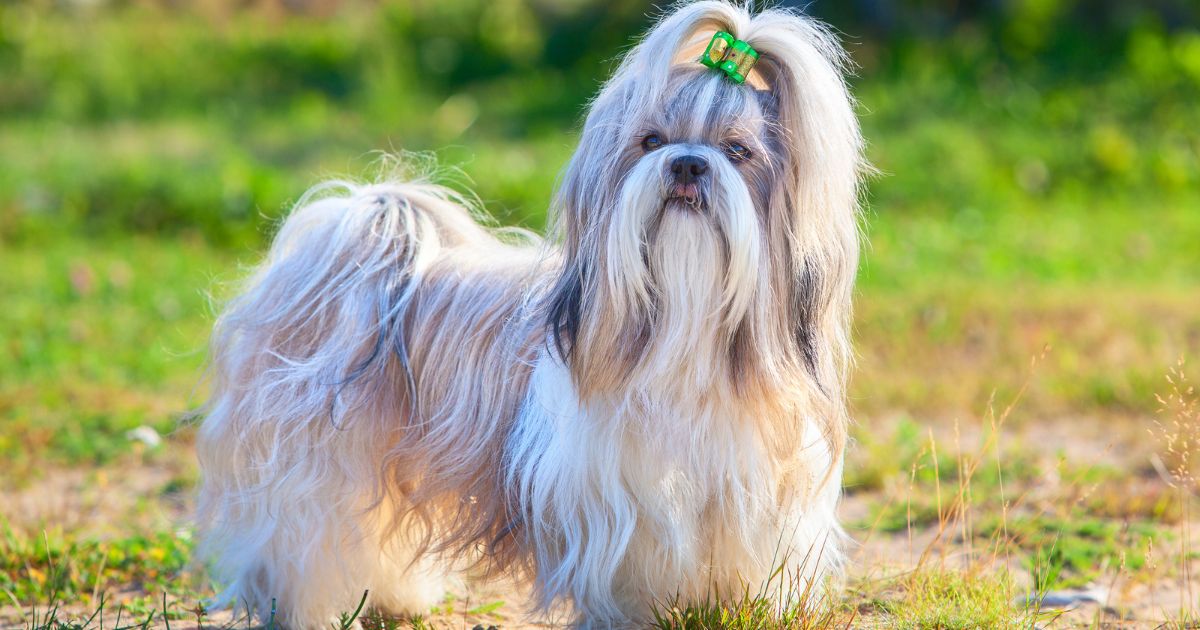
Shih Tzus are small dogs with a sturdy build and a distinct appearance. They have a height of 8 to 11 inches (20 to 28 cm) and a weight of 9 to 16 pounds (4 to 7 kg) 1. One of the most noticeable features of the Shih Tzu is their floppy ears that hang down on either side of their head. These ears are covered in long hair that can easily get tangled and matted, so regular grooming is essential.
Another defining characteristic of the Shih Tzu is their double coat. This means they have an outer layer of long, silky hair and a thick, woolly undercoat. The coat can come in a variety of colors, including black, white, gold, and brown. Some Shih Tzus have a mix of colors in their coat, while others have a solid color.
The Shih Tzu’s coat requires regular grooming to prevent matting and tangling. It is recommended that you brush your Shih Tzu’s coat daily to keep it healthy and shiny. In addition to brushing, you may need to trim their hair around the eyes, ears, and paws to prevent irritation and infection.
In terms of their overall appearance, the Shih Tzu has a round face with large, dark eyes and a short, snub nose. Their legs are short and sturdy, and their tail is carried over their back. Despite their small size, Shih Tzus have a confident and dignified demeanor that makes them stand out in a crowd.
Overall, the Shih Tzu’s physical characteristics make them a unique and beloved breed. With proper grooming and care, they can live a long and healthy life as a cherished member of your family.
Shih Tzu Temperament
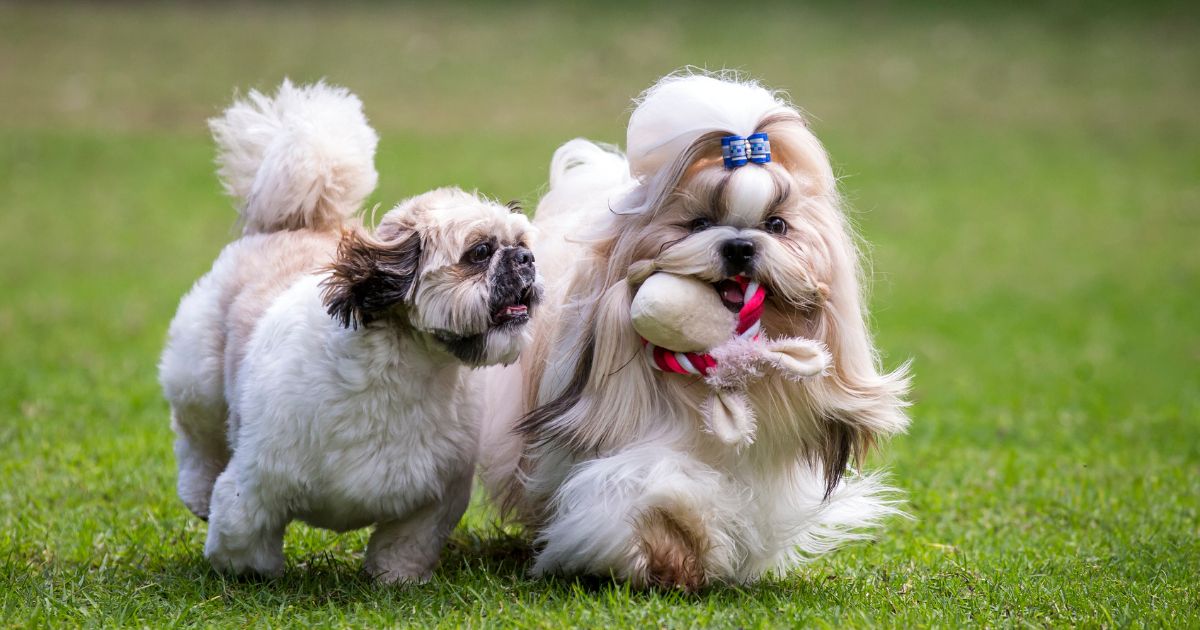
Shih Tzus are affectionate dogs that love to be around their family. They are known for their playful nature and energetic personality. However, they can also be stubborn and require a firm hand when it comes to training.
Socialization is crucial for Shih Tzus to prevent them from becoming timid or aggressive towards strangers. Introducing your Shih Tzu to different people and animals at a young age can help them become well-adjusted adults.
Despite their small size, Shih Tzus have a big personality and are confident in themselves. They enjoy being the center of attention and love to be pampered.
It’s important to note that every Shih Tzu is unique and may have their own quirks and personality traits. Some may be more laid-back while others may be more high-strung.
Overall, Shih Tzus make great companions for those who are looking for an affectionate and playful dog. However, their stubbornness and need for socialization should be taken into consideration before bringing one into your home.
Exercise and Training Needs

Shih Tzus require daily exercise to stay healthy and happy. Physical activity helps to keep your dog’s body in shape and can prevent obesity, which can lead to several health problems. However, Shih Tzus are not exactly athletes, and because of this, they can often become overweight.
To prevent obesity, it is important to provide your Shih Tzu with daily exercise. A daily walk or playtime in the backyard can provide enough physical activity to keep your dog in shape. However, keep in mind that Shih Tzus have a low exercise tolerance, so avoid overexerting them.
In addition to physical exercise, Shih Tzus also require mental stimulation. Training your Shih Tzu can be a great way to provide mental exercise. Shih Tzus are generally intelligent and eager to please, so they can be easy to train. Positive reinforcement methods, such as treats and praise, work well with this breed.
When training your Shih Tzu, keep in mind that they can be stubborn at times. Consistency and patience are key to successful training. Start with basic commands, such as sit, stay, and come, and gradually progress to more advanced tricks.
Overall, providing your Shih Tzu with daily exercise and training can help keep them healthy and happy. Just remember to avoid overexerting them and to be patient when training.
Grooming and Care

Taking care of your Shih Tzu’s grooming needs is essential to keep them healthy and happy. Here are some tips to help you maintain your pet’s hygiene:
Brushing
Regular brushing is important to prevent matting and tangling of your Shih Tzu’s hair. Use a slicker brush or a comb to remove any tangles and keep the coat smooth. Brush your pet’s hair at least once a day, and more often if your dog has a longer coat.
Bathing
Bathing your Shih Tzu is also essential to keep their coat clean and healthy. Use a gentle dog shampoo and make sure to rinse thoroughly. How often you bathe your pet depends on their lifestyle and coat thickness. Generally, it is recommended to bathe your Shih Tzu every three to four weeks, or more often if they get dirty or smelly.
Hair Loss
Shih Tzus are prone to hair loss, especially around their eyes and mouth. Regular grooming can help prevent hair loss and keep their coat healthy. If your pet is experiencing excessive hair loss, it is important to consult with your veterinarian to rule out any underlying health issues.
Oral Hygiene
Oral hygiene is also important for your Shih Tzu’s overall health. Regularly brushing your pet’s teeth with a dog toothbrush and toothpaste can help prevent dental problems such as gum disease and tooth decay. You can also give your pet dental chews or toys to help keep their teeth clean.
In conclusion, taking care of your Shih Tzu’s grooming needs is an important part of their overall health and wellbeing. Regular brushing, bathing, and oral hygiene can help prevent health issues and keep your pet happy and healthy.
Diet and Nutrition

Feeding your Shih Tzu a well-balanced diet is essential to maintaining their overall health and well-being. A balanced diet for a Shih Tzu should include protein, carbohydrates, essential fatty acids, and vitamins and minerals. It is important to choose high-quality dog food that is specifically formulated for small breeds like the Shih Tzu.
Overfeeding your Shih Tzu can lead to weight gain and obesity, which can cause a range of health problems, including joint issues and heart disease. It is important to monitor your dog’s weight and adjust their diet accordingly. If your Shih Tzu is overweight, you may need to reduce their food intake and increase their exercise.
Omega-3 and omega-6 fatty acids are essential for your Shih Tzu’s health. These fatty acids help maintain healthy skin and coat, reduce inflammation, and support brain and eye health. Look for dog food that contains high levels of these fatty acids or consider adding a fish oil supplement to your dog’s diet.
Avoid feeding your Shih Tzu foods that are toxic or harmful to their health. Some common foods to avoid include chocolate, onions, garlic, grapes, raisins, and avocados. These foods can cause serious health problems for your dog, including kidney failure and seizures.
In addition to providing your Shih Tzu with a balanced diet, it is important to ensure they have access to clean water at all times. Dehydration can cause a range of health problems, including kidney issues and urinary tract infections. Make sure your Shih Tzu has access to fresh water throughout the day and monitor their water intake.
Common Health Issues

As with any breed, Shih Tzus are prone to certain health issues. By being aware of these common health problems, you can take steps to prevent or manage them.
Dental Issues
Dental disease is prevalent in all breeds, but Shih Tzus are particularly susceptible to certain dental conditions. Periodontal or gum disease is seen in as many as 90% of dogs by the time they reach two years of age. Shih Tzus are at an increased risk of this condition due to their small mouths and crowded teeth. It is important to brush your Shih Tzu’s teeth regularly and schedule regular dental cleanings with your veterinarian.
Respiratory Issues
Shih Tzus are a brachycephalic breed, meaning they have a short snout and flat face. This can lead to respiratory issues such as Brachycephalic Obstructive Airway Syndrome (BOAS). Symptoms of BOAS include snoring, coughing, and difficulty breathing. If you notice any of these symptoms, it is important to take your Shih Tzu to the veterinarian for evaluation.
Eye Problems
Shih Tzus are prone to several eye problems, including cataracts, progressive retinal atrophy, and dry eye. Cataracts can lead to blindness if left untreated, while dry eye can cause discomfort and can lead to corneal ulcers. It is important to take your Shih Tzu to the veterinarian immediately if you notice any eye problems.
Obesity
Shih Tzus are not particularly active dogs, and as a result, they can easily become overweight. Obesity can lead to a variety of health problems, including joint problems, heart disease, and diabetes. It is important to monitor your Shih Tzu’s weight and feed them a healthy diet.
Heart Problems
Shih Tzus are prone to heart problems, particularly mitral valve disease. This condition causes the valve between the left atrium and left ventricle of the heart to weaken, leading to a leaky valve. Symptoms of heart problems in Shih Tzus include coughing, exercise intolerance, and rapid breathing. If you notice any of these symptoms, it is important to take your Shih Tzu to the veterinarian for evaluation.
By being aware of these common health issues, you can take steps to prevent or manage them. Regular veterinary check-ups, a healthy diet, and regular exercise can help keep your Shih Tzu healthy and happy.
Breathing Problems and Brachycephalic Syndrome
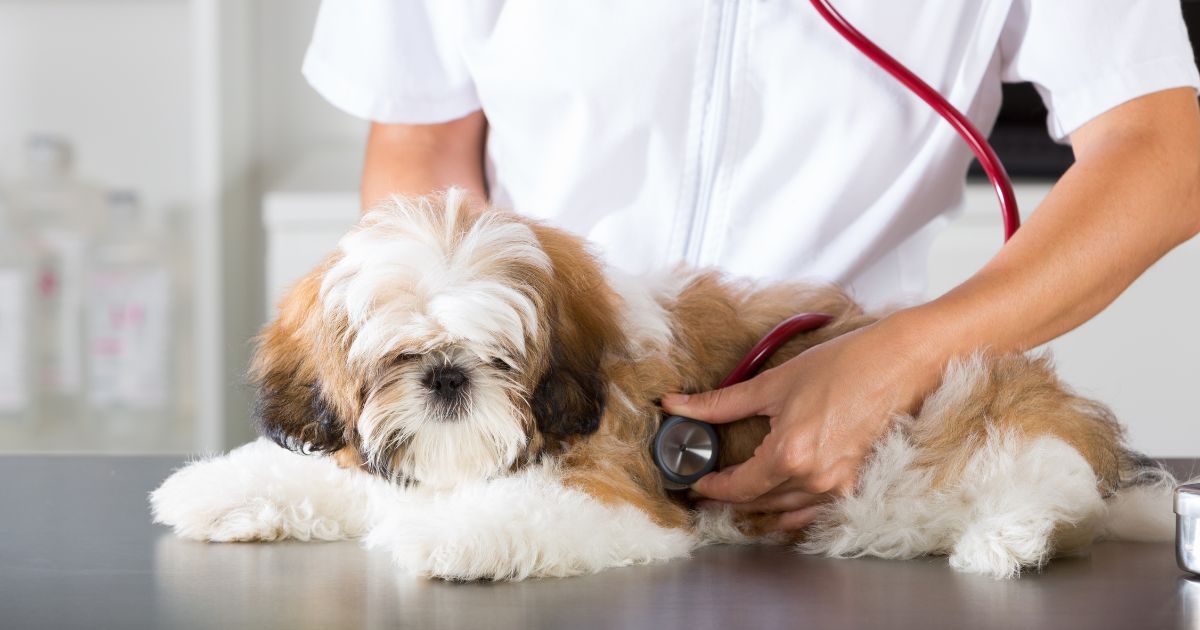
If you own a Shih Tzu, it’s important to be aware of the potential breathing problems that can arise due to their brachycephalic (short-nosed) facial structure. This can lead to a condition called Brachycephalic Airway Syndrome (BAS), which can cause a range of breathing problems.
One of the most common issues is stenotic nares, which are narrow nostrils that make it difficult for your Shih Tzu to breathe in enough air. This can lead to noisy breathing, especially when your dog is excited or exercising. Other symptoms of breathing problems can include coughing, panting excessively, and even fainting or slipping into a coma in severe cases.
BAS can also cause other structural abnormalities in the airway, including an elongated soft palate, which can obstruct the airway and cause breathing difficulties. The condition can also lead to a narrowed trachea, which can make it harder for your Shih Tzu to breathe deeply and can cause overheating.
If you suspect your Shih Tzu is experiencing breathing problems, it’s important to take them to the vet for an examination. Depending on the severity of the condition, treatment options can range from medication to surgery. In some cases, lifestyle changes such as weight loss or avoiding exercise in hot weather can help alleviate symptoms.
Overall, being aware of the potential breathing problems associated with brachycephalic syndrome can help you keep your Shih Tzu healthy and happy. By monitoring your dog’s breathing and seeking veterinary care when necessary, you can help ensure they lead a long and comfortable life.
Musculoskeletal Problems

Shih Tzus are prone to several musculoskeletal problems that can cause discomfort and pain. Here are some of the most common issues to watch out for:
Hip Dysplasia
Hip dysplasia is a genetic condition that affects the hip joint. It occurs when the ball and socket joint of the hip do not fit together properly, causing the joint to wear down over time. This can lead to arthritis, lameness, and abnormal gait.
Patellar Luxation
Patellar luxation, also known as a luxating patella, is a condition where the kneecap slides in and out of place. This can cause lameness and discomfort, and in severe cases, surgery may be necessary to correct the issue.
Arthritis
Arthritis is a common problem in older Shih Tzus. It is a degenerative condition that causes inflammation in the joints, leading to pain and stiffness. This can make it difficult for your dog to move around comfortably and may require medication to manage.
If you notice any signs of discomfort or abnormal gait in your Shih Tzu, it’s important to take them to the vet for an evaluation. Early intervention can help prevent these musculoskeletal problems from getting worse and improve your dog’s quality of life.
Eye Conditions

As a Shih Tzu owner, it’s important to be aware of the potential eye conditions that can affect your furry friend.
Here are some of the most common eye problems that Shih Tzus may experience:
- Dry Eye (Keratoconjunctivitis Sicca): Dry eye is a condition where the tear glands fail to produce enough tears to keep the eyes lubricated. This can result in discomfort, inflammation, and infection. Shih Tzus are prone to this condition, so it’s important to keep an eye out for symptoms such as redness, discharge, and frequent blinking. Treatment may include eye drops or ointments to lubricate the eye and stimulate tear production.
- Cataracts: Cataracts are a clouding of the lens in the eye, which can cause vision loss and even blindness if left untreated. Shih Tzus are predisposed to developing cataracts, so regular eye exams are important to catch this condition early. Treatment may include surgery to remove the cataract and replace the lens with an artificial one.
- Glaucoma: Glaucoma is a condition where the pressure inside the eye becomes too high, which can damage the optic nerve and cause vision loss. Shih Tzus are at a higher risk for developing glaucoma due to their shallow eye sockets. Symptoms may include redness, cloudiness, and a dilated pupil. Treatment may include eye drops or surgery to reduce the pressure in the eye.
- Ocular Proptosis: Ocular proptosis is a condition where the eye is displaced out of the socket, usually due to trauma or injury. Shih Tzus are at a higher risk for this condition due to their prominent eyes and shallow eye sockets. This is a medical emergency and requires immediate veterinary attention.
- Progressive Retinal Atrophy (PRA): PRA is a genetic condition that causes the retina to degenerate, leading to vision loss and eventual blindness. Shih Tzus are one of the breeds that are predisposed to this condition. Symptoms may include night blindness, dilated pupils, and a reflective tapetum in the eye. Unfortunately, there is no cure for PRA, but early detection can help slow the progression of the disease.
- Distichiasis: Distichiasis is a condition where extra eyelashes grow from the eyelid and irritate the cornea. Shih Tzus are prone to this condition, which can cause discomfort, redness, and discharge. Treatment may include removing the extra eyelashes or using eye drops to reduce inflammation.
Overall, it’s important to be vigilant about your Shih Tzu’s eye health and to seek veterinary attention if you notice any symptoms or changes in their eyes. Regular eye exams can help catch any potential problems early and ensure that your furry friend’s vision stays healthy.
Ear and Dental Health
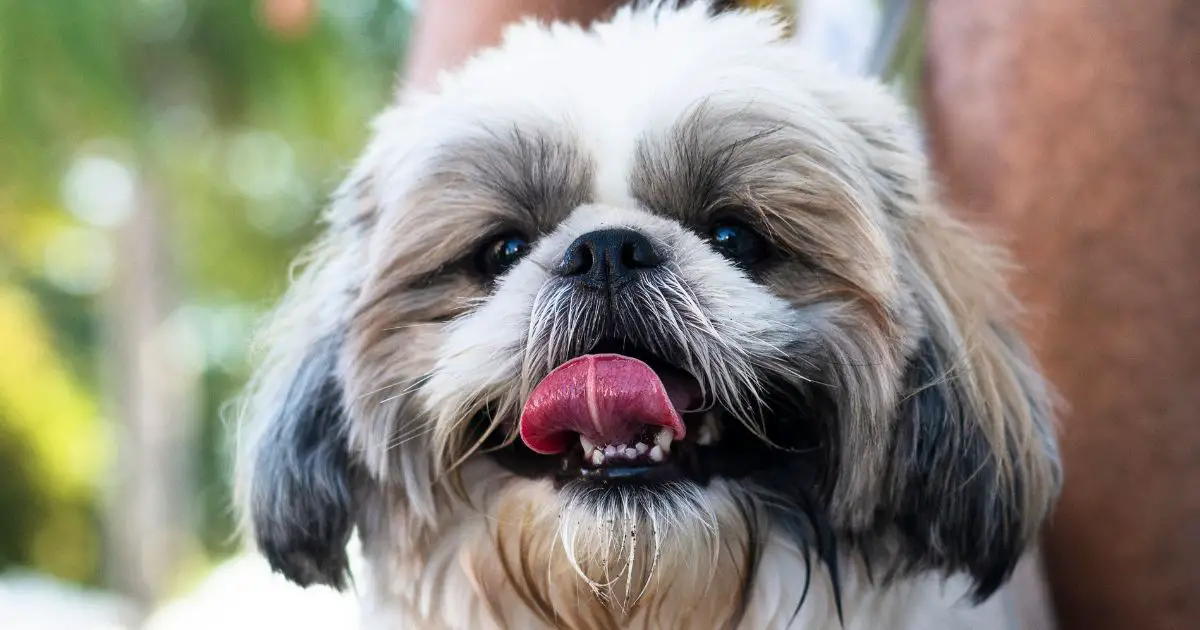
As a Shih Tzu owner, it is important to pay attention to your dog’s ear and dental health. Ear infections are a common problem for Shih Tzus due to their floppy ears, which can trap moisture and create a breeding ground for bacteria. To prevent ear infections, it is important to regularly clean your Shih Tzu’s ears and keep them dry. You can use a cotton ball or soft cloth to gently wipe the inside of the ear, being careful not to insert anything into the ear canal.
In addition to ear infections, dental disease is also a common problem for Shih Tzus. According to the American Kennel Club, Shih Tzus are prone to dental disease due to their small mouths and crowded teeth. Dental disease can cause pain, bad breath, and even tooth loss if left untreated. To prevent dental disease, it is important to brush your Shih Tzu’s teeth regularly and schedule regular dental cleanings with your veterinarian.
Parasites can also be a problem for Shih Tzus, both in the ears and the mouth. Ear mites are a common parasite that can cause itching, irritation, and infection in the ears. Your veterinarian can prescribe medication to treat ear mites if your Shih Tzu is affected. In the mouth, fleas and ticks can carry parasites that can cause health problems for your Shih Tzu. Talk to your veterinarian about the best way to protect your Shih Tzu from parasites.
Overall, taking care of your Shih Tzu’s ear and dental health is an important part of being a responsible pet owner. By regularly cleaning your Shih Tzu’s ears, brushing their teeth, and scheduling regular veterinary check-ups, you can help prevent common health problems and keep your Shih Tzu healthy and happy.
Other Health Conditions

In addition to the common health issues that Shih Tzus are prone to, there are several other health conditions that you should be aware of.
Allergies
Shih Tzus can be prone to allergies, which can cause symptoms such as itching, sneezing, and skin irritation. Allergies can be caused by a variety of factors, including food, pollen, and dust. If you suspect that your Shih Tzu has allergies, it is important to work with your veterinarian to identify the allergen and develop a treatment plan.
Surgery
Like all dogs, Shih Tzus may require surgery at some point in their lives. Common surgeries for Shih Tzus include spaying or neutering, dental procedures, and surgery to correct issues such as hip dysplasia or luxating patellas. It is important to work with a qualified veterinarian and follow all post-operative care instructions to ensure a successful recovery.
Inflammation
Inflammation can occur in any part of the body and can be caused by a variety of factors, including injury, infection, and autoimmune disorders. Inflammation can cause symptoms such as pain, swelling, and redness. If you suspect that your Shih Tzu is experiencing inflammation, it is important to work with your veterinarian to identify the underlying cause and develop a treatment plan.
Heart Disease
Shih Tzus can be prone to heart disease, which can cause symptoms such as coughing, difficulty breathing, and lethargy. Heart disease can be caused by a variety of factors, including genetics, age, and diet. If you suspect that your Shih Tzu is experiencing heart disease, it is important to work with your veterinarian to develop a treatment plan.
Liver Disease
Shih Tzus can be prone to liver disease, which can cause symptoms such as vomiting, diarrhea, and lack of appetite. Liver disease can be caused by a variety of factors, including genetics, medication, and infection. If you suspect that your Shih Tzu is experiencing liver disease, it is important to work with your veterinarian to identify the underlying cause and develop a treatment plan.
Windpipe Issues
Shih Tzus can be prone to issues with their windpipe, including collapsing trachea. This condition can cause symptoms such as coughing, difficulty breathing, and weakness. If you suspect that your Shih Tzu is experiencing issues with their windpipe, it is important to work with your veterinarian to develop a treatment plan.
Diabetes
Shih Tzus can be prone to diabetes, which can cause symptoms such as increased thirst, increased urination, and weakness. Diabetes can be caused by a variety of factors, including genetics and diet. If you suspect that your Shih Tzu is experiencing diabetes, it is important to work with your veterinarian to develop a treatment plan.
Glomerulonephropathy
Glomerulonephropathy is a condition that affects the kidneys and can cause symptoms such as increased thirst, increased urination, and weakness. This condition can be caused by a variety of factors, including genetics and infection. If you suspect that your Shih Tzu is experiencing glomerulonephropathy, it is important to work with your veterinarian to develop a treatment plan.
Paralysis
Shih Tzus can be prone to paralysis, which can be caused by a variety of factors, including injury and infection. Paralysis can cause symptoms such as weakness, loss of coordination, and inability to move. If you suspect that your Shih Tzu is experiencing paralysis, it is important to work with your veterinarian to identify the underlying cause and develop a treatment plan.
Oxygen
Shih Tzus can be prone to issues with oxygen, which can cause symptoms such as difficulty breathing and weakness. This can be caused by a variety of factors, including heart disease and lung disease. If you suspect that your Shih Tzu is experiencing issues with oxygen, it is important to work with your veterinarian to identify the underlying cause and develop a treatment plan.
Cartilage
Shih Tzus can be prone to issues with their cartilage, including conditions such as hip dysplasia and luxating patellas. These conditions can cause symptoms such as lameness, pain, and difficulty moving. If you suspect that your Shih Tzu is experiencing issues with their cartilage, it is important to work with your veterinarian to develop a treatment plan.
Shih Tzu Lifespan and Longevity

As a Shih Tzu owner, you may be wondering about the typical lifespan of your furry friend. On average, Shih Tzus live for 10 to 18 years, with an average lifespan of 13 years. However, some Shih Tzus may live well beyond this age, while others may not make it into their teens before passing away.
Although genetics plays a significant role in determining your Shih Tzu’s lifespan, several factors can help improve their longevity. Feeding your dog a healthy diet, providing regular exercise, and taking them for routine check-ups with a veterinarian are all essential steps in promoting a long and healthy life for your pet.
While Shih Tzus are generally healthy dogs, they can be prone to certain medical conditions. Some of the common health issues that this breed is predisposed to include hip dysplasia, patellar luxation, allergies, eye problems, and dental issues. Regular check-ups with a veterinarian can help detect these conditions early, allowing for prompt treatment and management.
It’s worth noting that a Shih Tzu’s coat color doesn’t directly affect their lifespan. However, certain genetic health conditions are more prevalent in specific coat colors, which could indirectly influence their longevity. For example, liver-colored Shih Tzus are more prone to liver shunts, while white Shih Tzus are more prone to deafness.
In summary, a Shih Tzu’s lifespan can vary, but with proper care and attention, you can help your furry friend live a long and healthy life. Regular check-ups with a veterinarian, a healthy diet, and plenty of exercise can all contribute to your Shih Tzu’s longevity.
Shih Tzu Rescues and Adoption

If you are considering adopting a Shih Tzu, there are many rescue organizations that can help you find the perfect pet. Shih Tzu rescues are typically run by volunteers who are passionate about the breed and dedicated to finding them loving homes.
One of the benefits of adopting a Shih Tzu from a rescue is that you will be able to provide a home for a dog in need. Many Shih Tzus end up in rescue due to neglect, abuse, or abandonment. By adopting a rescue dog, you will be giving them a second chance at a happy life.
Another advantage of adopting from a rescue is that the dogs are often already house-trained and have some basic obedience training. This can make the transition to their new home much easier for both you and the dog.
When looking for a Shih Tzu rescue, it is important to do your research and choose a reputable organization. Look for a rescue that is a registered non-profit and has a good track record of placing dogs in loving homes. You can also check with your local animal shelter or humane society to see if they have any Shih Tzus available for adoption.
It is important to keep in mind that rescue dogs may have some health or behavioral issues due to their past experiences. However, many of these issues can be addressed with proper care and training. Be sure to ask the rescue organization about any known health or behavioral issues before adopting a dog.
Overall, adopting a Shih Tzu from a rescue can be a rewarding experience for both you and the dog. You will be providing a loving home for a dog in need and gaining a loyal companion in the process.
FAQs
What are the most common health problems in Shih Tzus?
Shih Tzus are prone to several health issues, including dental problems, eye infections, respiratory problems, and skin allergies. They are also susceptible to hip dysplasia, which can cause pain and discomfort. Other common health problems in Shih Tzus include patellar luxation, which is a dislocated kneecap, and ear infections.
What are the signs of a healthy Shih Tzu puppy?
A healthy Shih Tzu puppy should have bright, clear eyes, a shiny coat, and a playful, energetic demeanor. They should also have a healthy appetite and be able to walk and run without any difficulty. It is important to note that puppies may have some health issues that are not immediately apparent, so it is important to have them examined by a veterinarian regularly.
What is the normal life expectancy of a Shih Tzu?
The average life expectancy of a Shih Tzu is between 10 and 16 years. However, with proper care and attention, some Shih Tzus have been known to live up to 20 years or more.
What is the leading cause of death in Shih Tzus?
The leading cause of death in Shih Tzus is old age. However, some Shih Tzus may also succumb to health issues such as heart disease, cancer, or liver problems.
What are some old age health problems that Shih Tzus may face?
As Shih Tzus age, they may experience health problems such as arthritis, dental problems, and vision and hearing loss. They may also be more susceptible to certain diseases, such as heart disease and cancer.
What are some common walking problems that Shih Tzus may experience?
Shih Tzus may experience walking problems due to their small size and short legs. They may have difficulty walking on slippery surfaces or climbing stairs. Some Shih Tzus may also develop joint problems, such as hip dysplasia, which can make it difficult for them to walk or run.


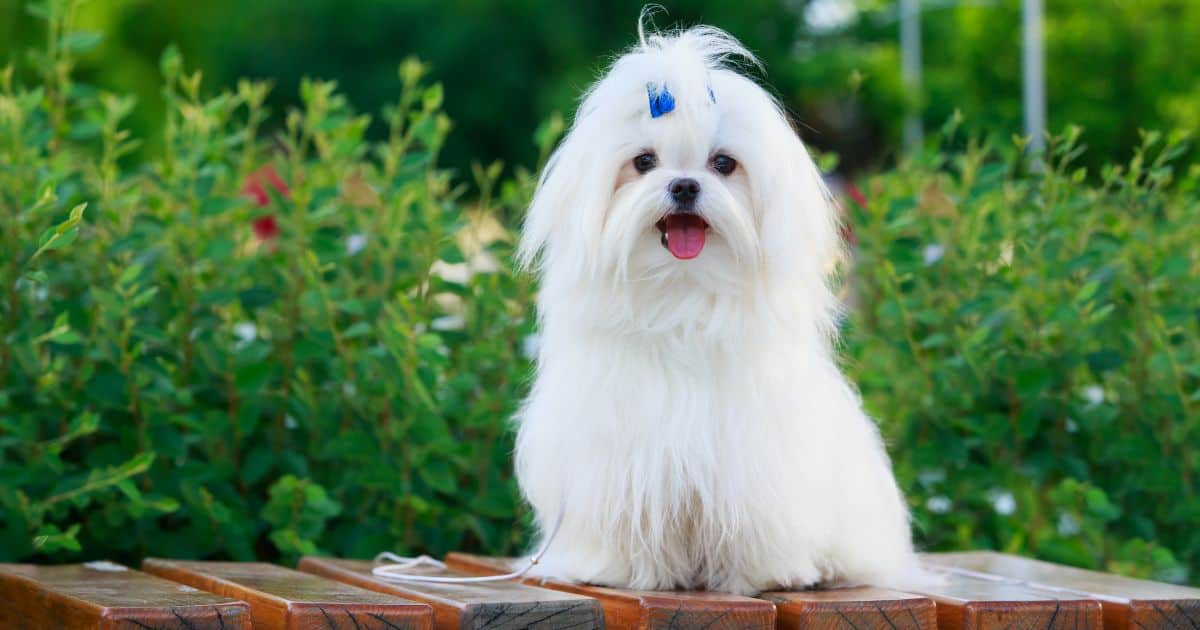

Leave a Reply
You must be logged in to post a comment.